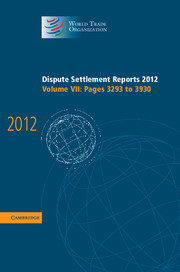Book contents
- Frontmatter
- TABLE OF CONTENTS
- CHINA – MEASURES RELATED TO THE EXPORTATION OF VARIOUS RAW MATERIALS
- Contents
- CASES CITED IN THESE REPORTS
- ABBREVIATIONS USED IN THESE REPORTS
- I INTRODUCTION
- II ARGUMENTS OF THE PARTICIPANTS AND THE THIRD PARTICIPANTS
- III ISSUES RAISED ON APPEAL
- IV THE PANEL'S TERMS OF REFERENCE
- V THE PANEL'S RECOMMENDATIONS
- VI APPLICABILITY OF ARTICLE XX
- VII ARTICLE XI:2(a) OF THE GATT 1994
- VIII ARTICLE XX(g) OF THE GATT 1994
- IX FINDINGS AND CONCLUSIONS IN THE APPELLATE BODY REPORT WT/DS394/AB/R
- X FINDINGS AND CONCLUSIONS IN THE APPELLATE BODY REPORT WT/DS395/AB/R
- XI FINDINGS AND CONCLUSIONS IN THE APPELLATE BODY REPORT WT/DS398/AB/R
- ANNEX I Request for the Establishment of a Panel by the United States, WT/DS394/7
- ANNEX II Request for the Establishment of a Panel by the European Communities, WT/DS395/7
- ANNEX III Request for the Establishment of a Panel by Mexico, WT/DS398/6
- ANNEX IV Notification of an Appeal by China, WT/DS394/11, WT/DS395/11, WT/DS398/10
- ANNEX V Notification of an Other Appeal by the United States, WT/DS394/12
- ANNEX VI Notification of an Other Appeal by the European Union, WT/DS395/12
- ANNEX VII Notification of an Other Appeal by Mexico, WT/DS398/11
- Contents
- TABLE OF WTO CASES CITED IN THESE REPORTS
- GATT DISPUTE SETTLEMENT AND WORKING PARTY REPORTS
- ABBREVIATIONS OF MEASURES, EVIDENCE, AND OTHER INSTRUMENTS REFERRED TO IN THIS RULING
- TABLE OF ABBREVIATIONS
- I INTRODUCTION
- II FACTUAL ASPECTS
- III PARTIES' REQUESTS FOR FINDINGS AND RECOMMENDATIONS
- IV ARGUMENTS OF THE PARTIES
- V ARGUMENTS OF THE THIRD PARTIES
- VI INTERIM REVIEW
- VII FINDINGS
- VIII CONCLUSIONS AND RECOMMENDATIONS
- Cumulative List of Published Disputes
V - THE PANEL'S RECOMMENDATIONS
from CHINA – MEASURES RELATED TO THE EXPORTATION OF VARIOUS RAW MATERIALS
Published online by Cambridge University Press: 03 January 2018
- Frontmatter
- TABLE OF CONTENTS
- CHINA – MEASURES RELATED TO THE EXPORTATION OF VARIOUS RAW MATERIALS
- Contents
- CASES CITED IN THESE REPORTS
- ABBREVIATIONS USED IN THESE REPORTS
- I INTRODUCTION
- II ARGUMENTS OF THE PARTICIPANTS AND THE THIRD PARTICIPANTS
- III ISSUES RAISED ON APPEAL
- IV THE PANEL'S TERMS OF REFERENCE
- V THE PANEL'S RECOMMENDATIONS
- VI APPLICABILITY OF ARTICLE XX
- VII ARTICLE XI:2(a) OF THE GATT 1994
- VIII ARTICLE XX(g) OF THE GATT 1994
- IX FINDINGS AND CONCLUSIONS IN THE APPELLATE BODY REPORT WT/DS394/AB/R
- X FINDINGS AND CONCLUSIONS IN THE APPELLATE BODY REPORT WT/DS395/AB/R
- XI FINDINGS AND CONCLUSIONS IN THE APPELLATE BODY REPORT WT/DS398/AB/R
- ANNEX I Request for the Establishment of a Panel by the United States, WT/DS394/7
- ANNEX II Request for the Establishment of a Panel by the European Communities, WT/DS395/7
- ANNEX III Request for the Establishment of a Panel by Mexico, WT/DS398/6
- ANNEX IV Notification of an Appeal by China, WT/DS394/11, WT/DS395/11, WT/DS398/10
- ANNEX V Notification of an Other Appeal by the United States, WT/DS394/12
- ANNEX VI Notification of an Other Appeal by the European Union, WT/DS395/12
- ANNEX VII Notification of an Other Appeal by Mexico, WT/DS398/11
- Contents
- TABLE OF WTO CASES CITED IN THESE REPORTS
- GATT DISPUTE SETTLEMENT AND WORKING PARTY REPORTS
- ABBREVIATIONS OF MEASURES, EVIDENCE, AND OTHER INSTRUMENTS REFERRED TO IN THIS RULING
- TABLE OF ABBREVIATIONS
- I INTRODUCTION
- II FACTUAL ASPECTS
- III PARTIES' REQUESTS FOR FINDINGS AND RECOMMENDATIONS
- IV ARGUMENTS OF THE PARTIES
- V ARGUMENTS OF THE THIRD PARTIES
- VI INTERIM REVIEW
- VII FINDINGS
- VIII CONCLUSIONS AND RECOMMENDATIONS
- Cumulative List of Published Disputes
Summary
236. We now turn to address China's appeal regarding the Panel's recommendations concerning export duties and export quotas.
237. China seeks review of the Panel's recommendations “to the extent that they apply to annual replacement measures” adopted after the establishment of the Panel on 21 December 2009. China argues that the complainants had excluded such measures from the scope of the dispute and, hence, by making recommendations extending to such measures, the Panel acted inconsistently with its obligations under Article 7.1 of the DSU; failed to make an objective assessment of the matter under Article 11 of the DSU; and made recommendations on measures that were not part of the matter, inconsistently with Article 19.1 of the DSU. In response, the United States, the European Union, and Mexico argue that the Panel's recommendations were correctly made in accordance with Articles 7.1, 11, and 19.1 of the DSU on the measures challenged by the complainants as they existed at the time of the Panel's establishment. The United States and Mexico posit that, without such recommendations, “trade measures imposed in part through annually recurring legal instruments could never be successfully challenged through WTO dispute settlement”. The European Union adds that “this is not the proper forum to determine the actions China should take in order to bring itself into compliance with its WTO obligations”; rather, China should follow the procedures provided for under Article 21 of the DSU in order to identify the scope of its compliance obligations.
- Type
- Chapter
- Information
- Dispute Settlement Reports 2012 , pp. 3398 - 3414Publisher: Cambridge University PressPrint publication year: 2014

